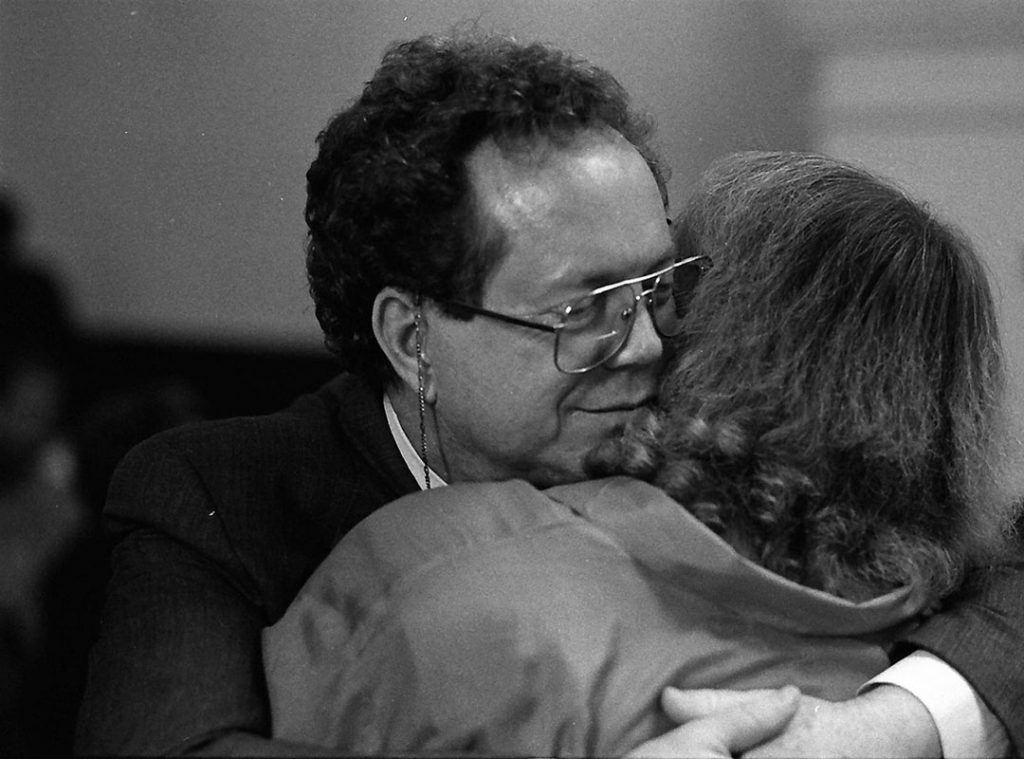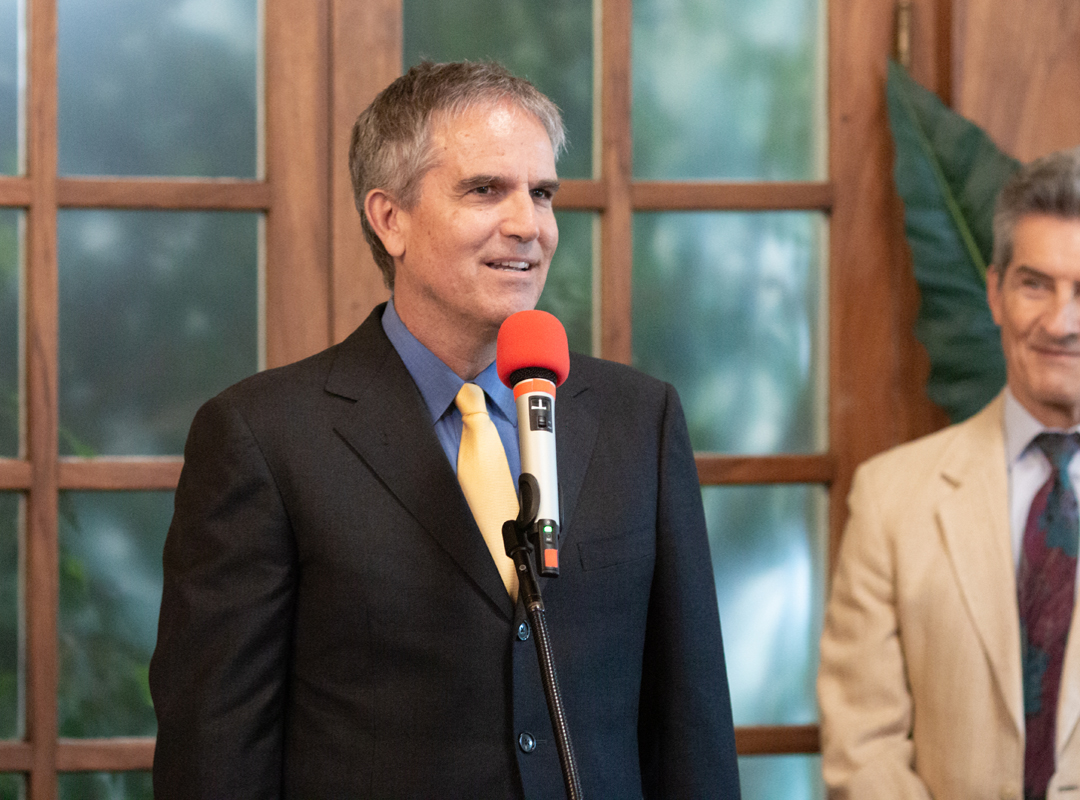John-Roger, circa 1989.
The Supreme God dispenses absolute balance; and that is not punishment. Man punishes. God loves. - John-RogerThis article by John-Roger was first published in the Movement Newspaper, March 1974.
The idea of “punishment” is a universal one, which stems from quite a few ideas. One punishment is a person’s reaction to someone different from themselves – “I punish you because you are not like me and because you are not doing things the way I want you to do them. Therefore I punish you.” If this idea is presented to people, many will say, “No, that isn’t why I’m punishing you.” So you say, “Then you must feel like you have a right to punish me. What is your right to punish me?” If they say, “I’m your mother or your father; therefore I have the right to punish you,” you may often say, “Yes.” But children often add, “Then when I’m older and out on my own and no longer under your control, I can punish you” – which comes to the second idea of punishment, which is getting even. This is the old law of Moses: “An eye for an eye and a tooth for a tooth.” I think the Bible says, “Vengeance will be mine, thus saith the Lord.” On the lower levels, this is an accurate point of view. But the Supreme God dispenses absolute balance; and that is not punishment. Man punishes. God loves. God even loves men who punish and those who receive the punishment – “equally.”
Many times you may enter into dispensing punishment when you feel you’re being hemmed in, when you find that someone is crowding in on you, when they are usurping your authority over your own domain – “What right have they got to look in my books?” “What right do they have to ask how much money I have?” When you have established your “sovereign divinity” over the things that you say are yours, you really feel right and justified in punishing whomever gets into that area. Maybe you reach out and slap their hands or shoot them or threaten them or something else.
But, when you reach out to hit someone else, all you’re doing is punishing yourself because you’re really saying, “I just can’t handle it any other way.” I’d like to relate personal experience as an example of this point of view. I have two dogs at home who may be smarter than anyone else in the house. When they were still pretty young, we were fixing up a “barrier” so they could have one part of the house and leave us the rest of the house – as sort of a compromise. But the dogs wanted the part of the house where I was. So many hours were spent devising a way to keep two poodles hemmed into a small area of the house. We’d get all fixed up, then we’d put them on the other side, and we’d call them and whistle – and they’d find a way to overcome whatever obstacle we’d placed in front of them.
We tried a lot of ways – without much success. Finally those who were working on this thought they had really come up with a “foolproof” barrier that would keep them in. So we put them on the other side, and this time we didn’t call them; we just sat and watched them work to get through. Well, one dog got through a space only a couple inches wide – a space that objectively he could never have gotten through. I was watching the auras of the others in the room and some reflected the impulse to grab a dog and “cram” him right back through the hole – with love, naturally. And some of the auras reflected the impulse to hit him with something so he wouldn’t try that again. I saw these things so I thought I’d demonstrate it to them; I picked up a piece of paper and hit it hard on the floor in front of the dog; and the dog backed off from that opening, but he found his way through another before too long. He wasn’t going to let anything stop him. Both dogs are smart. They learned to get through that “restriction,” and we constructed another one, which they also learned to get through.
It took quite awhile before we found a way to keep them within a certain area. We could have punished them, and they would have stopped getting through the spaces. We could have hit them hard enough that they would have become very fearful. But we would have lost them as soon as we’d done that. Punishment is a losing proposition; but then sometimes people do learn in punishment. But they will learn so much more effectively through positive reinforcement and through love.
Most people have been punished a great deal in their lives, and sometimes the punishment is that they are not allowed to think for themselves. People don’t allow children to think; they think for them – “Do as you’re told and don’t talk back. And don’t you dare question me.” A child asks, “Why?” And you love them so you tell them again. And they say, “Why?” So you tell them again and you think they’ve got it, and they say, “Why?” And about that time you “pop” them in the mouth or you punish them by giving them some nonsense statement that they know is not true at all; and right there you create a breakdown in communication that may effect the next forty years – and you’ll know that you did it because you punished a child when he asked, “Why?” He didn’t want to know why, he wanted to know how does it work?
When a child asks, “Why?” he’s really asking “How does this thing work? How can I work it?” So that way you give the answer. Then if it’s something mechanical, they’ll get the idea of how to work with it. One time I was with friends and their child was asking about soap and washing the dishes and washing the clothes; and he kept up with “Why? Why?” until they said a few choice words which I’m sure they didn’t really mean. When they were through, I picked the child up, put him on the sink, turned on the water, put soap in his hands, and started rubbing them together so we got lots of suds and bubbles. I said, “Now do you understand why?” And he said, “Yes.” He saw what happened with soap. He didn’t need to know any other information. Information wasn’t his level. His level was, “How does this thing do it?” Words did not relate to him because he did not understand the words after you told them to him. But he did understand how it worked. He did understand the experience.
If someone asks you a question and you have to punish them, it’s because you have failed to show them how it works or to explain to them how to do it. People are more often after the experience of something rather that the information. If you can bring an experience forward to people, show them something through which they can expand the range of their experience and creativity, you will have successful communication.
Baruch Bashan


















I remember hearing JR tell a story like this…then I forgot. I am still like the child. When will I grow up? (rhetorical question 🙂